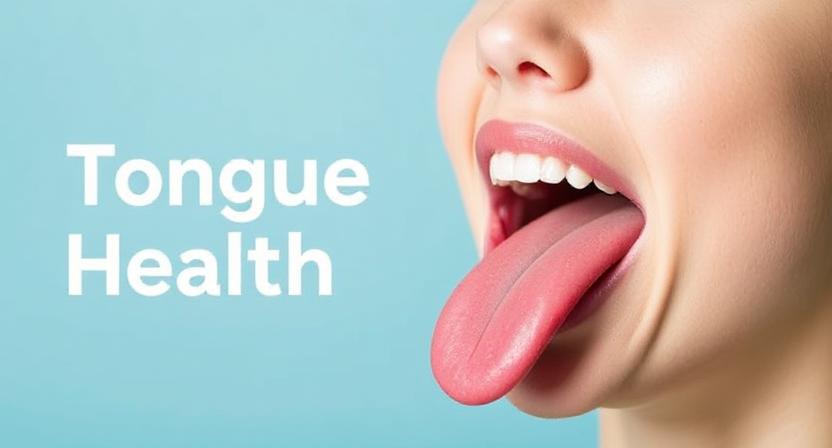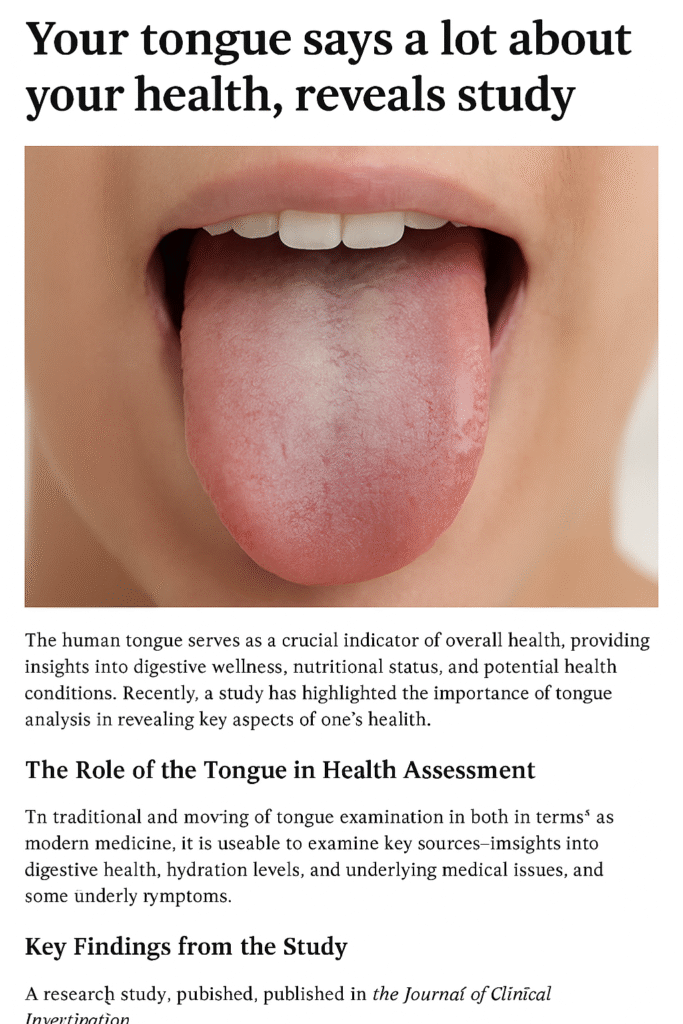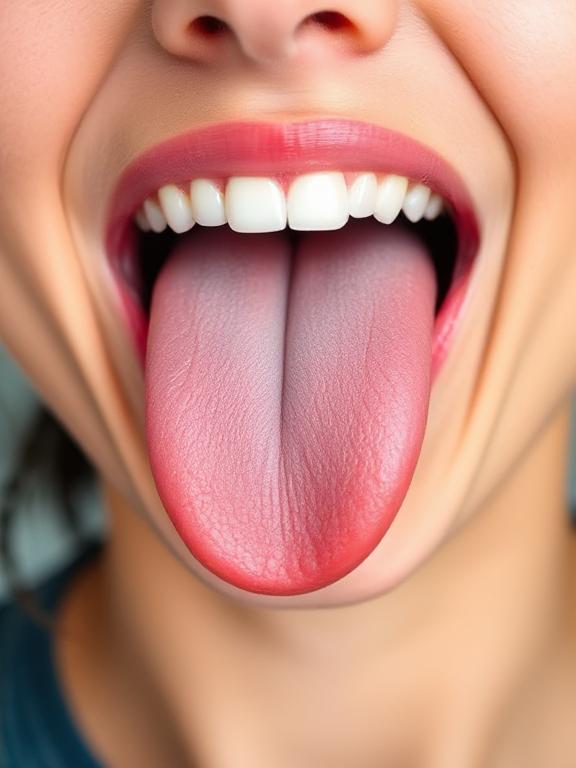Most people rarely think twice about their tongue unless they burn it on hot coffee or bite it accidentally. But according to recent health studies, your tongue is far more than a tool for taste—it’s a mirror reflecting your inner health. From its color and texture to unusual coatings or patches, your tongue can offer vital clues about various systemic issues happening in your body.
A growing body of research and traditional medical systems like Ayurveda and Traditional Chinese Medicine (TCM) have long emphasized the diagnostic power of the tongue. In fact, a study published in the Journal of Oral Science and various clinical reviews reveal that your tongue can help detect infections, nutritional deficiencies, digestive issues, and even signs of more severe conditions like diabetes or autoimmune diseases.
Let’s take a deep dive into what your tongue might be telling you about your health and why it’s time to start paying attention to it.
What Your Tongue Can Reveal About Your Health
1. Tongue Color
- Healthy Tongue: A healthy tongue is typically pink with a light white coating.
- Bright Red: This could indicate a deficiency in B vitamins, especially B12 or folic acid. In children, it may be a sign of scarlet fever.
- Pale or White: Often linked to anemia or a weakened immune system. In TCM, a pale tongue can mean “qi deficiency”.
- Purple or Blue: May be a sign of poor blood circulation or heart problems.
- Yellow: Can be associated with liver or gallbladder issues and sometimes fever or infections.
2. Tongue Coating
- Thick White Coating: Often a sign of oral thrush (a fungal infection), poor digestion, or excessive sugar intake.
- Yellow Coating: May indicate digestive issues, particularly related to the stomach or liver.
- No Coating at All: A smooth, shiny tongue could point to a vitamin deficiency, particularly B12 or iron.
3. Tongue Texture
- Smooth Tongue (Glossitis): May indicate iron, folate, or B12 deficiency.
- Scalloped Edges: A common sign of bruxism (teeth grinding), hypothyroidism, or anxiety.
- Cracks or Fissures: Usually harmless but may suggest dehydration, Sjogren’s syndrome, or vitamin B-complex deficiencies.
4. Tongue Movements
- Trembling Tongue: Might suggest anxiety, stress, or neurological issues.
- Deviation to One Side: Can indicate a neurological issue or past stroke.
Scientific Backing: What the Studies Say
A study conducted by researchers at the Peking University School of Stomatology explored how tongue characteristics could be used to diagnose chronic illnesses. They found that specific tongue changes were consistently linked with diseases such as diabetes, digestive disorders, and infections.
Another study published in the International Journal of Environmental Research and Public Health highlighted the use of tongue diagnosis in telemedicine, especially in the early detection of COVID-19, where symptoms like tongue discoloration and thick coatings were reported in patients.
Medical Conditions Your Tongue May Reflect
| Tongue Sign | Possible Condition |
|---|---|
| Pale tongue | Anemia, nutritional deficiency |
| Bright red tongue | Vitamin B deficiency, Kawasaki disease (in children) |
| White patches or coating | Oral thrush, leukoplakia, dehydration |
| Black or brown tongue | Smoking, poor oral hygiene, antibiotic use |
| Burning sensation | Menopause, nerve damage, allergic reaction |
| Smooth, bald tongue | Iron or folic acid deficiency |
| Ulcers or sores | Canker sores, viral infections, autoimmune diseases |
| Lumps or growths | Oral cancer (if persistent) |
Traditional Medicine and Tongue Diagnosis
Ayurveda
In Ayurvedic medicine, the tongue is divided into different zones that correspond to specific organs. The tip reflects heart health, the middle area relates to the stomach and spleen, and the back indicates kidney and bladder health. Cracks, discoloration, or coating in a specific zone can indicate issues with that organ.
Traditional Chinese Medicine (TCM)
TCM uses tongue diagnosis as a key diagnostic tool. Practitioners analyze the tongue’s shape, coating, moisture, and color to understand the balance of internal energies, or “qi”. For example:
- A red tip may point to excess heat in the heart.
- A thick coating suggests dampness or phlegm accumulation.
- A swollen tongue could signal spleen qi deficiency.
How to Examine Your Tongue at Home
You don’t need to be a doctor to start observing your tongue regularly. Here’s how:
- Stand in front of a mirror with good lighting.
- Stick out your tongue and examine the color, shape, coating, and any spots.
- Look at the sides, underneath, and back of the tongue as well.
- Note any pain, swelling, or changes that persist beyond 10 days.
When to See a Doctor
While occasional changes in your tongue may be harmless, certain symptoms should prompt a medical check-up:
- Persistent white or red patches
- Lumps or ulcers that don’t heal in 2 weeks
- Burning or tingling sensations
- Sudden changes in color or texture
- Difficulty swallowing or moving the tongue
Daily Tongue Care Tips
- Brush your tongue gently every morning to remove bacteria and toxins.
- Stay hydrated to avoid dryness and cracks.
- Avoid tobacco and limit alcohol to prevent staining and irritation.
- Eat a balanced diet rich in vitamins and minerals.
- Use a tongue scraper for deeper cleaning.
- Regular dental checkups help spot any unusual changes early.
20 Frequently Asked Questions (FAQs)
1. What does a healthy tongue look like?
A healthy tongue is pink, moist, with a thin white coating and no cracks or sores.
2. Why is my tongue white and coated?
It may be due to oral thrush, dehydration, poor oral hygiene, or digestive issues.
3. Can my tongue show signs of cancer?
Yes, persistent lumps, ulcers, or red/white patches that don’t heal could indicate oral cancer.
4. What does a red tongue mean?
Often a sign of a vitamin deficiency (B12), infection, or inflammation.
5. Why does my tongue have cracks?
Cracks (fissured tongue) are usually harmless but may indicate dehydration or vitamin deficiency.
6. What causes a black hairy tongue?
Usually due to poor oral hygiene, smoking, or certain antibiotics.
7. Is a smooth tongue normal?
Not always. It can point to nutrient deficiencies or a condition called glossitis.
8. What is the white stuff on my tongue in the morning?
It’s a buildup of dead cells, bacteria, and debris. It’s normal in small amounts but should be cleaned.
9. Can stress affect my tongue?
Yes, stress and anxiety can cause trembling, biting, or scalloping on the edges.
10. How often should I check my tongue?
At least once a week, or daily if monitoring a specific symptom.
11. Are tongue blisters serious?
Usually not, but persistent or painful sores should be evaluated.
12. Can brushing my tongue make a difference?
Yes, it reduces bacteria, freshens breath, and improves overall oral health.
13. Why does my tongue burn?
Could be due to a condition called burning mouth syndrome, allergies, or menopause.
14. What causes scalloped edges on the tongue?
Often due to teeth pressure from grinding or swelling from fluid retention.
15. Can dehydration change my tongue?
Yes, it can make the tongue dry, cracked, or coated.
16. Should I be worried about a yellow tongue?
It may be due to bacteria or digestive issues—if persistent, consult a doctor.
17. Does my diet affect my tongue’s health?
Absolutely. Lack of vitamins like B12, iron, and folate directly affects tongue appearance.
18. What is leukoplakia?
A condition causing white patches on the tongue, often linked to smoking or irritation—needs medical evaluation.
19. Can oral hygiene improve my tongue’s appearance?
Yes, regular cleaning, hydration, and avoiding irritants significantly help.
20. How do I know if tongue changes are serious?
If symptoms persist more than two weeks, are painful, or interfere with eating or speaking, consult a healthcare professional.
Conclusion
Your tongue is more than just a sensory organ—it’s a diagnostic window into your body’s health. With mounting scientific evidence and traditional wisdom aligning, it’s clear that paying attention to your tongue can give early warning signs of many underlying health conditions. So the next time you brush your teeth, don’t forget to take a good look at your tongue—it might just be trying to tell you something important.





